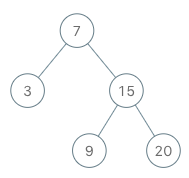173. Binary Search Tree Iterator
Difficulty: Medium
Topics: Stack, Tree, Design
Similar Questions:
Problem:
Implement an iterator over a binary search tree (BST). Your iterator will be initialized with the root node of a BST.
Calling next() will return the next smallest number in the BST.
Example:

BSTIterator iterator = new BSTIterator(root); iterator.next(); // return 3 iterator.next(); // return 7 iterator.hasNext(); // return true iterator.next(); // return 9 iterator.hasNext(); // return true iterator.next(); // return 15 iterator.hasNext(); // return true iterator.next(); // return 20 iterator.hasNext(); // return false
Note:
next()andhasNext()should run in average O(1) time and uses O(h) memory, where h is the height of the tree.- You may assume that
next()call will always be valid, that is, there will be at least a next smallest number in the BST whennext()is called.
Solutions:
/**
* Definition for a binary tree node.
* struct TreeNode {
* int val;
* TreeNode *left;
* TreeNode *right;
* TreeNode(int x) : val(x), left(NULL), right(NULL) {}
* };
*/
class BSTIterator {
public:
BSTIterator(TreeNode* root) {
while (root) {
stk.push(root);
root = root->left;
}
}
/** @return the next smallest number */
int next() {
TreeNode* node = stk.top(); stk.pop();
int ret = node->val;
node = node->right;
while (node) {
stk.push(node);
node = node->left;
}
return ret;
}
/** @return whether we have a next smallest number */
bool hasNext() {
return !stk.empty();
}
private:
stack<TreeNode*> stk;
};
/**
* Your BSTIterator object will be instantiated and called as such:
* BSTIterator* obj = new BSTIterator(root);
* int param_1 = obj->next();
* bool param_2 = obj->hasNext();
*/